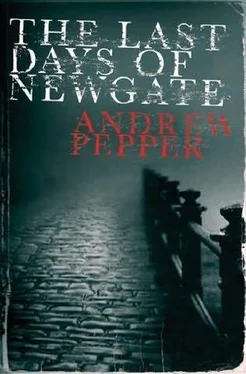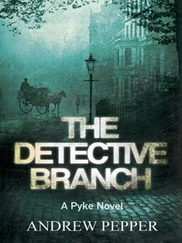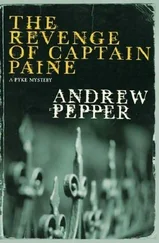Andrew Pepper - The Last Days of Newgate
Здесь есть возможность читать онлайн «Andrew Pepper - The Last Days of Newgate» весь текст электронной книги совершенно бесплатно (целиком полную версию без сокращений). В некоторых случаях можно слушать аудио, скачать через торрент в формате fb2 и присутствует краткое содержание. Жанр: Исторический детектив, на английском языке. Описание произведения, (предисловие) а так же отзывы посетителей доступны на портале библиотеки ЛибКат.
- Название:The Last Days of Newgate
- Автор:
- Жанр:
- Год:неизвестен
- ISBN:нет данных
- Рейтинг книги:4 / 5. Голосов: 1
-
Избранное:Добавить в избранное
- Отзывы:
-
Ваша оценка:
- 80
- 1
- 2
- 3
- 4
- 5
The Last Days of Newgate: краткое содержание, описание и аннотация
Предлагаем к чтению аннотацию, описание, краткое содержание или предисловие (зависит от того, что написал сам автор книги «The Last Days of Newgate»). Если вы не нашли необходимую информацию о книге — напишите в комментариях, мы постараемся отыскать её.
The Last Days of Newgate — читать онлайн бесплатно полную книгу (весь текст) целиком
Ниже представлен текст книги, разбитый по страницам. Система сохранения места последней прочитанной страницы, позволяет с удобством читать онлайн бесплатно книгу «The Last Days of Newgate», без необходимости каждый раз заново искать на чём Вы остановились. Поставьте закладку, и сможете в любой момент перейти на страницу, на которой закончили чтение.
Интервал:
Закладка:
Townsend assured him he would do whatever he could. ‘Shall we go in?’
Pyke did not want to, but since a further inspection of the room itself seemed necessary, he did not have a choice in the matter. He needed to know more about the victims and this was his last attachment to them, to their world. If, as he believed, the murders were not the work of a crazed madman, an escaped Bedlamite perhaps, then it followed that the victims had been selected and indeed killed for a reason. Find the reason and he would find the killer. Though he had said little to Fox on the subject, Pyke instinctively believed the victims had known their killer or killers.
They stepped into the room.
Apart from the mattress, it had been stripped bare. Even the floorboards had been scrubbed clean, and aside from the dark stains that remained, there was little or nothing to suggest what had taken place there.
Initially, when he had been told about the removal of all possessions to number four Whitehall, Pyke had been disappointed and angry because he had thought their usefulness as clues depended on their physical presence in the room. But as he waited for his eyes to adjust to the gloom, Pyke felt relieved by their absence and indeed by the absence of the three bodies. The room seemed both larger and more peaceful. It afforded him the opportunity to think, to put himself in their places and try to imagine what they had gone through. Taking no notice of the dark stain, he sat down against the wall farthest from the door, in the position that he had found Stephen Magennis in, and put his hands behind his back, as though bound.
‘Why did he tie them up?’ Pyke said, half to himself and half to his companion.
He imagined his mouth was gagged, imagined the metal pail in front of him, and closed his eyes.
‘You reckon he tied ’em up before he slit their throats?’
‘Possibly.’
‘Perhaps he tied ’em up in order to slit their throats. Keep ’em still.’
It made some kind of sense but Pyke was not quite convinced. Sitting in the darkness, he tried to imagine what had happened: in what order had the killings taken place? Had the murderer slit the throats of the parents and then throttled the baby? Or had it happened the other way around? What if the parents had witnessed the killing of their baby?
This thought struck him with the force of a lightning bolt. What might it have been like for them: having to watch as their own baby was strangled in front of their disbelieving eyes? To watch, bound and helpless, while someone squeezed the life out of the most precious thing in their life?
‘What if they were tied up because the murderer actually wanted them to witness him killing their baby?’
Townsend was standing on the threshold. His figure was silhouetted in the door frame. ‘Why would he want ’em to witness it?’
‘What if he knew them?’
Townsend did not say anything.
‘What if it was personal?’ Pyke thought about it: what if they had been attacked and knocked unconscious initially, bound and gagged while unconscious, and brought round by having urine thrown into their faces? What if they had been brought round because they were meant to see it happen?
‘That would be a brutal thing,’ Townsend said, guardedly.
‘The two of them were propped up against the wall, where I am. The metal pail was placed in the middle of the room. It resembled a stage. In which case, the parents might have been the audience.’
‘You think someone would be capable of such. .’
‘Cruelty?’ Pyke said, looking up at Townsend. It was almost impossible to imagine so, but instinct told him it was an idea worth pursuing. It didn’t mean he was any closer to actually finding who had done these things, or why, but it did mean finding out more about the victims would perhaps lead Pyke one step closer to their killer. Or, indeed, their killers, because Pyke could not be sure that only one man was involved.
Townsend shrank back on to the landing. Pyke heard him mutter something under his breath.
Standing up, Pyke stretched his numbed legs. On the blackened wall he noticed a small crucifix. Nothing in the room indicated anything of the victims’ personalities and, in order to find their killer, he needed to know something more about their lives. Therefore Pyke knew his first task was to do as Fox suggested: finding the missing cousin was now his main priority.
SIX
It had always amused Pyke that the view from Sir Richard Fox’s walnut-panelled office at the front of number five Bow Street took in the Brown Bear tavern, where prostitutes as young as fourteen cavorted with thieves who used its upstairs rooms to plan robberies, exchange gossip and dispose of stolen goods. It amused him that the portrait of Sir Henry Fielding, the man who had founded the Bow Street Runners, which hung on the wall above a marble fireplace, stared down at Fox, who, in turn, stared out of his window at criminals going about their business. It seemed to make a mockery of Sir Henry’s ambitions.
Fox did not appear to be suffering from any ill effects as a result of his humiliation at the hands of Peel. In fact, he seemed to be more enthusiastic than Pyke had seen him in a while — when Pyke stepped into his office he leapt up off his armchair, came over to greet him and launched into questions. What had Peel wanted and why had he insisted that Pyke stay behind?
Certainly Fox did not seem to be worried about the lynching of Catholics taking place across the city. All he said on the subject, with some satisfaction, was that Peel and the duke would have to postpone their plans to introduce the Catholic Emancipation Act. He didn’t mention the Metropolitan Police Bill.
Pyke explained that Peel had merely wanted him to elaborate on his speculations. Peel had seemed worried that, if there were parallel investigations into the St Giles murders, they might arrive at different conclusions and such a state of affairs could end up being politically embarrassing.
He said Peel had requested that he leave the investigative work to Hume’s team, but he was to make himself available, to assist them if his help was needed. Pyke believed something of what he told Fox was true: Peel’s desire to keep him close at hand was motivated by the fear that he might unearth something potentially threatening to the cause of police reform and Catholic emancipation.
Fox appeared to believe Pyke’s account of his meeting without reservation. It was as he had expected.
But Fox was not about to relinquish his responsibility without a struggle and had already questioned Goddard and Townsend about what they had learned of the victims from any of the residents who lodged with Miss Clamp.
Pyke asked about the missing cousin.
Fox returned to his chair and sat down. ‘A neighbour, Mrs Jackman, who shared one of the upper-floor rooms, was on speaking terms with the deceased. She informed Goddard that she didn’t know whether the young girl who shared their room was Clare’s cousin or not, but she provided him with a name and a description. Mary Johnson. No more than twenty years old, attractive but frail, with brown hair, a thin face and freckles. The neighbour chatted to her once. The girl had an Irish brogue. She told Mrs Jackman that she worked in a nearby factory as a seamstress, but Mrs Jackman said to Goddard that she often saw her dressed in expensive clothes, dresses made of satin and silk, and that she doubted Johnson would have been able to afford such items on what she earned as a seamstress.’ He looked up at Pyke, pleased with himself.
‘You’re saying that she was not a seamstress at all,’ Pyke said.
‘Perhaps.’
‘A pretty young girl with expensive clothes.’
‘It means one of two things, doesn’t it?’
Читать дальшеИнтервал:
Закладка:
Похожие книги на «The Last Days of Newgate»
Представляем Вашему вниманию похожие книги на «The Last Days of Newgate» списком для выбора. Мы отобрали схожую по названию и смыслу литературу в надежде предоставить читателям больше вариантов отыскать новые, интересные, ещё непрочитанные произведения.
Обсуждение, отзывы о книге «The Last Days of Newgate» и просто собственные мнения читателей. Оставьте ваши комментарии, напишите, что Вы думаете о произведении, его смысле или главных героях. Укажите что конкретно понравилось, а что нет, и почему Вы так считаете.












